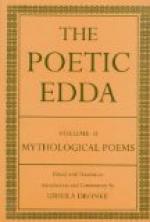“Bind up the red rings, Sigurd; it is not kingly to fear. I know a maid, fairest of all, decked with gold, if thou couldst get her. Green roads lead to Giuki’s, fate guides the wanderer forward. There a mighty king has a daughter; Sigurd will buy her with a dowry. There is a hall high on Hindarfell; all without it is swept with fire.... I know a battle-maid who sleeps on the fell, and the flame plays over her; Odin touched the maid with a thorn, because she laid low others than those he wished to fall. Thou shalt see, boy, the helmed maid who rode Vingskorni from the fight; Sigrdrifa’s sleep cannot be broken, son of heroes, by the Norns’ decrees.”
Sigrdrifa (dispenser of victory) is, of course, Brynhild; the name may have been originally an epithet of the Valkyrie, and it was probably such passages as this that misled the author of Gripisspa into differentiating the Valkyrie and Brynhild. The last lines have been differently interpreted as a warning to Sigurd not to seek Brynhild and an attempt to incite him to do so by emphasising the difficulty of the deed; they may merely mean that her sleep cannot be broken except by one, namely, the one who knows no fear. Brynhild’s supernatural origin is clearly shown here, and also in the prose in Sigrdrifumal. Voelsunga Saga, though it paraphrases in full the passages relating to the magic sleep, removes much of the mystery surrounding her by providing her with a genealogy and family connections; while the Nibelungen Lied goes further still in the same direction by leaving out the magic sleep. The change is a natural result of Christian ideas, to which Odin’s Wishmaidens would become incomprehensible.
Thus far the story is that of the release of the enchanted princess, popularly most familiar in the nursery tale of the Sleeping Beauty. After her broken questions to her deliverer, “What cut my mail? How have I broken from sleep? Who has flung from me the dark spells?” and his answer, “Sigmund’s son and Sigurd’s sword,” she bursts into the famous “Greeting to the World”:
“Long have I slept, long was I sunk in sleep, long are men’s misfortunes. It was Odin’s doing that I could not break the runes of sleep. Hail, day! hail, sons of day! hail, night! Look on us two with gracious eyes, and give victory to us who sit here. Hail, Aesir! hail, Asynjor! hail, Earth, mother of all! give eloquence and wisdom to us the wonderful pair, and hands of healing while we live.”
She then becomes Sigurd’s guardian and protectress and the source of his wisdom, as she speaks the runes and counsels which are to help him in all difficulties; and from this point corresponds to the maiden who is the hero’s benefactress, but whom he deserts through sorcery: the “Mastermaid” of the fairy-tales, the Medeia of Greek myth. Gudrun is always an innocent instrument in drawing Sigurd away from his real bride, the actual agent being her witch-mother Grimhild. This part of the story is summarised in Gripisspa, except that the writer seems unaware that the Wishmaiden who teaches Sigurd “every mystery that men would know” and the princess he betrays are the same:




